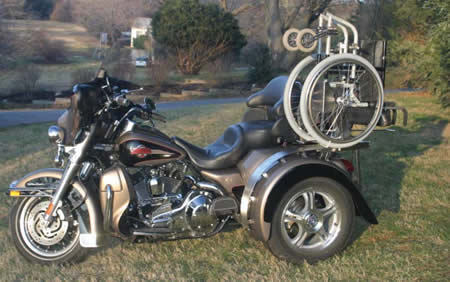|
Volume 17, No. 1, Winter 2009 |
Subscribe to AT Messenger Download PDF Viewer |
| PDF Version (for printing) Large Print (PDF) Text Version |
Not Quite “Homegrown in Delaware”
Recreation and leisure activities are experiences many of us strive to enjoy. For some, riding a motorcycle provides the perfect opportunity for both. But what happens when the person wanting to ride is disabled in some way? Are motorcycles out of the question for people with disabilities? DATI's own Eddie Jory says that motorcycles are definitely not out of the question! In fact, Eddie has adapted motorcycles on his own so that he can continue to enjoy the open road safely. Not everyone is so inclined or skilled, however, to do such modifications independently. No worries! Eddie found a shop that can do the work for you, Haus of Trikes, and he took the time to do a brief interview with the owner that we share here in a question and answer format.
When & why did Haus of Trikes open for business?
Jeff Pickard, owner and operator of the shop, opened for business in 2001 after he experienced a traumatic injury resulting in the loss of both his legs at the knees. He was told he would never ride again. That didn't seem to deter him because he went out and bought himself a trike, liked it, and started his business.
What type of modifications do you offer, and how many have you performed?
A wide variety of modifications to existing two-wheeled motorcycles are offered. In order to stabilize a bike and eliminate the need for the rider to balance it, sidecars are attached to two-wheelers, or the back wheel is replaced with a side-by-side pair of wheels to create a trike. There are two options for this modification—conversions and the Voyager system—offering an appropriately sized set of training wheels or outrigger wheels that stabilize the motorcycle and cost less than other systems. Clutches are adapted, brake controls relocated, standard shift systems are switched out for electric, and wheelchair racks are installed. These modifications offer "moral support" and increase the ease and safety of riding for people with disabilities. Though he couldn’t say how many trikes he’s modified, Jeff said that clients come from all over the United States and Europe.
What are some of the most significant disabilities for which you have adapted motorcycles?
Most modifications are provided for customers who have had single leg amputations or strokes, although one rider experienced double leg amputations above the knees, and another had his arm amputated at the shoulder. In addition, we have been able to accommodate people with neuropathies, which result in numbness and lack of feeling, by providing a bigger break pedal.
Are adapted motorcycles safe for people with disabilities to operate?
Yes, they can be safe with appropriate training.
Are they expensive, and who pays for the modifications?
The cost is more reasonable when compared to converting a car. As for who pays for the work, the Veterans Administration (VA) may help, but no other organization or agency is known to provide grants for such modifications. Costs are typically out-of-pocket for the cyclist.
Are there limitations to who is allowed to have a license to be street legal on an adapted motorcycle?
Riders must pass a written and road test on the adapted bike, and there is a medical review board evaluation required. Contact the State of Delaware Division of Motor Vehicles for all the specifics.
Do you call in other experts for special requests?
Yes, specialists for custom and manufactured special items are consulted.
Where is the Haus of Trikes located?
The shop address is 36350 Dupont Boulevard (Route 113), Selbyville, Delaware 19975. Contact Jeff at 410-251-2146, info@hausoftrikes.com, or visit the website at www.hausoftrikes.com.

Here is a wheelchair lift on a custom trike. The wheelchair is attached to an arm on a track that lifts it onto the fender. The lift gives riders wheels on their bike or in their chair and is the product of The Freedom Track, www.freedom-track.com.
It's Time to Think About Summer Camp
Taxicab Service and the ADA: Questions and Answers
15th Annual Inclusion Conference
It’s a SNAP to Prepare for an Emergency
Not Quite “Homegrown in Delaware”
Emergency Roadside Assistance and More for Wheelchair Users
Upcoming Delaware Expos for People in Their 50s and Older, Their Families, and People Who Serve Them

